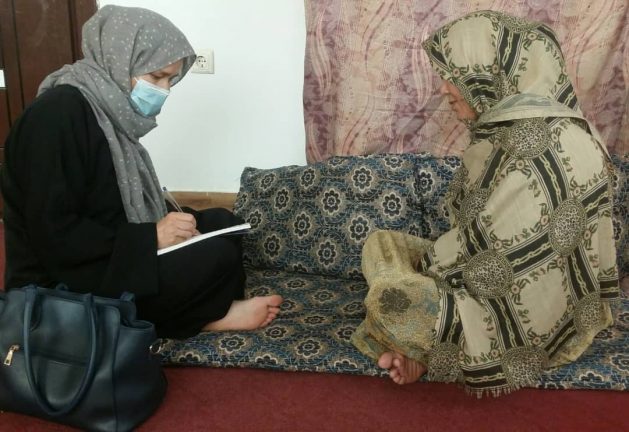Amidst Tears and Grief, Afghan Women Call Out To the World

Nov 06 (IPS) - The author is an Afghanistan-based female journalist, trained with Finnish support before the Taliban take-over. Her identity is withheld for security reasons“When the sun rises in the morning, I see the light but I don't feel like I'm having a bright day. I think about how different these days are from our past days”.
These are the words of Sharifa, 48, an Afghan mother of five as she recounts her life story wrought by the Taliban when they regained power two years ago. Tears streamed down her face as she narrated her story in the two-room house of her family in the Dasht e Barchi Qala area, far from the capital city Kabul.
Sharifa lost her job as a cleaner because Afghan women were no longer allowed to work under the Taliban. Her two young girls had to stop school for the same reason.
“Will we have a future?” she asked. “We live in a country where all women and girls are deprived of all their legal rights, and we don't know what will happen tomorrow”, her final concern is, “we are worried about the future of our children”.
To Sharifa and millions of Afghan women, the return of the Taliban, the extremist Islamic group that took over power in August 2021 portended nothing but misery for them.
“I think about the future, on the outside I may seem alive, but inside I feel dead”, she says, with tears streaming down her face.
For the past five years, the family led a quite peaceful and happy life without worries in the Dasht e Barchi Qala area in Afghanistan. Sharifa describes her husband as a kind and compassionate person.
After she lost her job, her husband became the sole breadwinner for the family of seven. It became necessary therefore, for their eldest son who had dropped out of school due to lack of money to work and bring in supplementary income.
Sharifa’s own education was cut short at the tenth grade due to the demands of raising a family. Given that situation, she was determined to do all in her power to provide adequate education to her five children – two boys and three daughters.
“I was a mother who, with all the problems and challenges in life, wanted all my children to have a higher education so that they could serve their country and family in the future”.
But all her hopes came crushing when the Taliban took power. It became clear that female students above the sixth grade could no longer continue their education. Women were also asked to stay home and cease working. Only the university was not banned.
But the saddest part for Sharifa was the loss of her daughter, the eldest of her children. At 24, she had completed 12th grade, and despite of the prohibition placed on girls’ education, was still plowing ahead with great determination to go the university.
Little did she know that the enemies of girls’ education were lurking around the corner. A bomb blast hit the Kaj educational centre in Kabul at precisely the time she was busy writing the university entrance examination. The educational centre held 500 students, 320 of them girls.
The blast had devastating consequences. Fifty female students were killed and 130 injured. Among the dead was Sharifa’s daughter.
“When I heard that the educational center was attacked, I was shocked, and rushed to the scene bare-footed to look for my daughter”, she said.
Dozens of families lost their loved ones that day but to their consternation, when they arrived at the scene, the dead and the wounded had already been transferred to hospitals. The Taliban had barred people from entering the centre except for ambulances.
The ISIS took responsibility for the attack, which was condemned widely around the world. Taliban officials also strongly condemned the attack and promised that the perpetrators would be punished, but nothing has been done since.
Sharifa says that the day she received her daughter's body for burial, was the bitterest and most painful day because all her wishes were also buried with her daughter.
“From that day until today, I only breath, but I don't feel alive”, she says.
In the midst of the grief however, Sharifa continues to demand for women’s rights and calls for support from the international community and the UN, to stop the Taliban from oppressing Afghan women.
“The women of Afghanistan have the right to play an active role in their society, in all different sectors, social, cultural, economic, and political fields”, Sharifa demands.
© Inter Press Service (2023) — All Rights Reserved. Original source: Inter Press Service
Where next?
Browse related news topics:
Read the latest news stories:
- Financing for Whom? The Financing for Development Summit Must Address Social Dimensions Thursday, April 24, 2025
- The Growth of One-Person Households Thursday, April 24, 2025
- ‘Noboa Did Not Receive a Blank Cheque: He Will Have to Show Tangible Results’ Thursday, April 24, 2025
- UN Warns of an Imminent Collapse in Haiti Thursday, April 24, 2025
- This Election Campaign Offers Two Opposing Visions of How to Tackle Insecurity Thursday, April 24, 2025
- Rampant Tourism, Climate Change Threatens Varkala's Unique Geodiversity Thursday, April 24, 2025
- A Nation Bleeds While the World Watches: The Tragedy in Sudan Must End Thursday, April 24, 2025
- African Countries Still Underfunding Health by as Much as 50 Percent Thursday, April 24, 2025
- Gaza: Aid ban pushes civilians to the brink Thursday, April 24, 2025
- UN warns of rising deportations of Haitian mothers and newborns from Dominican Republic Thursday, April 24, 2025